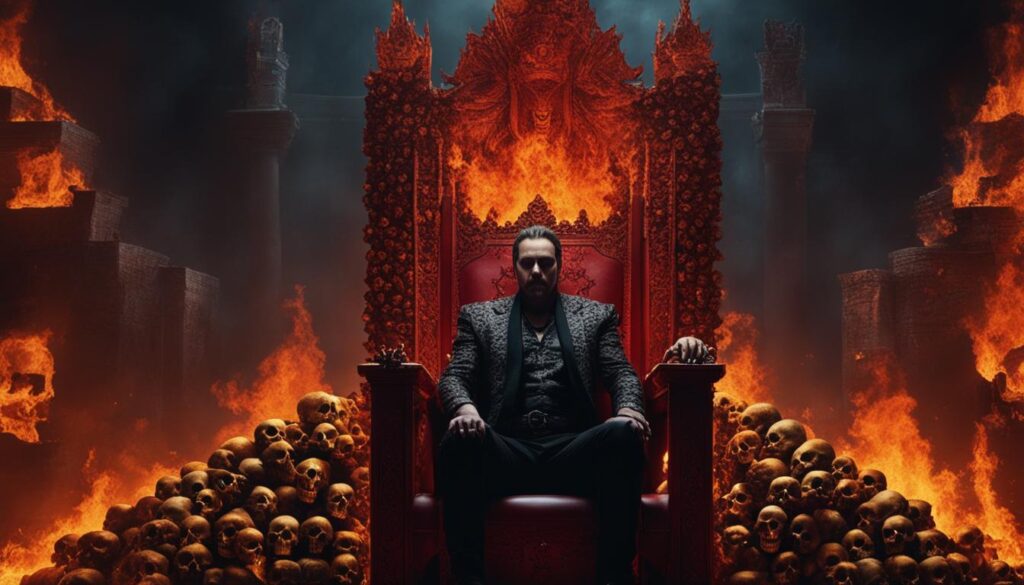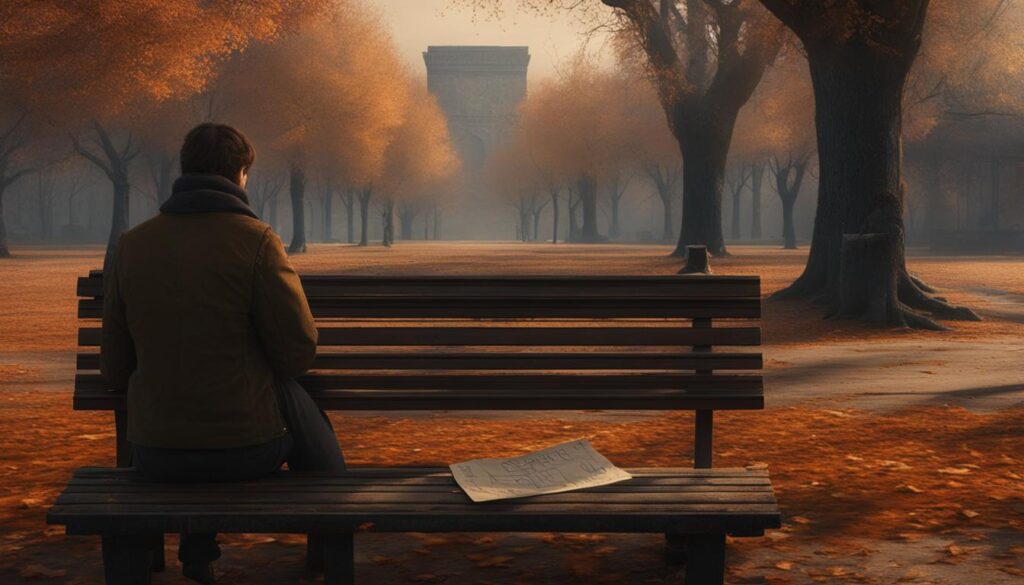Welcome to a world where laughter meets discomfort, where jokes twist the boundaries of taboo, and where humor dances on the razor’s edge. In this article, we dive deep into the intriguing realm of dark humor. We’ll explore why some might believe their sense of humor can lead them straight to hell. Brace yourself for a thought-provoking journey that will challenge preconceptions and shed light on the enigmatic allure of offensive comedy and dark jokes.
Key Takeaways:
- Dark humor delves into taboo subjects and makes light of serious or painful topics.
- Distressing near-death experiences can involve encounters with darkness, emptiness, and even hellish landscapes.
- Black comedy addresses taboo and controversial topics, aiming to provoke discomfort, serious thought, and amusement.
- Dark humor serves as a coping mechanism for individuals dealing with dark and challenging subject matter.
- Approaching dark humor requires sensitivity and awareness of its potential effects.
The Disturbing Side of Near-Death Experiences
Near-death experiences (NDEs) are often described as pleasant or even glorious, but there is a lesser-known side to these experiences that can be deeply disturbing. Some NDEs are characterized by feelings of hostility, threat, and panic. For example, individuals may perceive pleasurable elements as hostile or threatening, and experience scenarios that are bizarre and unsettling. These distressing NDEs can involve encounters with darkness, emptiness, aloneness, and even hellish landscapes. The descriptions of these experiences paint a vivid picture of the traumatic and rupturing nature of these real encounters. It is important to note that distressing NDEs are less common than pleasant ones, but they do exist and provoke serious questions about the nature of reality.
Exploring the Dark Humor Genre
Black comedy, also known as dark humor, is a genre of comedy that incorporates elements of taboo subjects, vulgar issues, and controversial topics. Its aim is to provoke discomfort, serious thought, and amusement by addressing subjects that are generally considered serious or painful to discuss. Unlike blue comedy, which focuses on crude topics like nudity and sex, and straightforward obscenity, black comedy delves into the darker aspects of human existence.
With a long history dating back to ancient Greek authors, black comedy is often associated with satire and cynicism. It serves as a powerful form of social commentary, highlighting the absurdity and hypocrisy of society. This genre challenges societal norms and pushes the boundaries of what is acceptable in comedy.
The unique appeal of black comedy lies in its ability to make light of the darkest aspects of life. Whether it’s exploring death, violence, or tragedy, black comedy takes these sensitive topics and presents them in a way that prompts both discomfort and laughter. It confronts the uncomfortable truths of the human condition and provides an outlet for individuals to cope with these harsh realities through laughter.
“Humor is just another defense against the universe.” – Mel Brooks
Through black comedy, individuals can find relief from the weight of their own experiences by relating to the shared struggles of humanity. It allows them to confront their fears and anxieties in a safe and controlled environment, fostering a sense of empowerment and resilience. In many ways, black comedy gives a voice to those who feel silenced by the darkness around them.
While black comedy may not be for everyone, it plays an important role in the comedy landscape. Its ability to provoke both uncomfortable emotions and genuine laughter is a testament to its power. By exploring the dark humor genre, we gain a deeper understanding of the complexities of human nature and the role comedy plays in navigating life’s darkest moments.

Famous Examples of Black Comedy
| Movie | Director | Year |
|---|---|---|
| A Clockwork Orange | Stanley Kubrick | 1971 |
| Pulp Fiction | Quentin Tarantino | 1994 |
| Dr. Strangelove | Stanley Kubrick | 1964 |
| Fargo | Coen Brothers | 1996 |
| American Psycho | Mary Harron | 2000 |
Coping with the Dark Side of Humor
Dark humor serves as a coping mechanism for individuals who have to deal with dark and challenging subject matter in their professions or environments. This includes professions like police officers, firefighters, ambulance crews, military personnel, journalists, lawyers, and funeral directors. Engaging in dark humor can help strengthen the morale of the oppressed and undermine the morale of oppressors. It allows individuals to distance themselves from the traumas and challenges they face, providing relief from the emotional burden. However, it is important to acknowledge that the use of dark humor depends on the context and can differ among individuals.
Psychological Effects: The psychological effects of using dark humor are complex, as it can both alleviate and exacerbate distress. Coping with difficult situations through humor can help individuals regain a sense of control, foster resilience, and create social bonds with others facing similar challenges. By reframing distressing experiences into comedic narrative, individuals may find temporary relief from psychological strain. On the other hand, dark humor may also intensify negative emotions and perpetuate feelings of cynicism or nihilism. It is crucial to recognize the potential psychological impact and evaluate how dark humor affects individuals on a personal level.
Gallows Humor: Gallows humor is a specific form of dark humor that focuses on controversial and morbid topics, such as death, tragedy, and suffering. It is commonly used in professions dealing with life-and-death situations, like paramedics, emergency room doctors, or soldiers, as a way to cope with the inherent seriousness and pressure of their work. Gallows humor allows individuals to find solace in shared experiences and create a sense of camaraderie amidst challenging circumstances. It acts as a release valve, providing temporary relief from stress and helping to process complex emotions.
As with any coping mechanism, the use of dark humor should be approached with sensitivity and respect. What may be humorous to one person could be deeply offensive to another. It is essential to consider the feelings and experiences of those involved and be mindful of any potential harm caused by insensitive jokes or remarks. While dark humor can be a powerful tool for coping, it is important to strike a balance between finding relief and maintaining empathy and compassion.

Conclusion
Dark humor is a complex and often controversial form of comedy that evokes discomfort, serious thought, and amusement. It pushes the boundaries of societal norms and allows individuals to explore taboo subjects. Through the exploration of dark humor and its relationship with distressing near-death experiences, we can understand the power of humor as a coping mechanism and its ability to elicit both positive and negative emotions.
It is crucial to approach this genre of comedy with sensitivity and awareness of its potential effects. While dark humor can provide relief and laughter in the face of difficult circumstances, it is important to consider the impact it may have on individuals who have experienced trauma or loss. Understanding the history, nature, and coping mechanisms associated with dark humor allows us to appreciate its complexity while navigating its potential emotional impact.
In conclusion, dark humor challenges societal norms and prompts individuals to question the boundaries of comedy. It serves as a coping mechanism for some, allowing them to find solace in the face of challenging situations. However, it is essential to exercise empathy and sensitivity when engaging with dark humor, as it can provoke strong reactions and emotions. By embracing the complexities of dark humor, we can better understand its place in society and the unique perspectives it offers.
FAQ
What is dark humor?
Dark humor, also known as black comedy or morbid humor, is a style of comedy that explores taboo subjects and makes light of serious or painful topics. It involves using jokes and comedy to provoke discomfort, serious thought, and amusement for the audience.
What are distressing near-death experiences (NDEs)?
Distressing near-death experiences are less commonly known and are characterized by feelings of hostility, threat, and panic. These experiences can involve encounters with darkness, emptiness, aloneness, and even hellish landscapes. They raise questions about the nature of reality and the traumatic aspects of real encounters.
What is black comedy?
Black comedy, also known as dark humor, is a genre of comedy that incorporates elements of taboo subjects, vulgar issues, and controversial topics. It aims to provoke discomfort, serious thought, and amusement by addressing subjects that are generally considered serious or painful to discuss.
How does dark humor serve as a coping mechanism?
Dark humor provides a coping mechanism for individuals who have to deal with dark and challenging subject matter in their professions or environments. It allows individuals to distance themselves from traumas and challenges, providing relief from emotional burdens and strengthening morale.
How should dark humor be approached?
Dark humor should be approached with sensitivity and awareness of its potential effects. It is a complex and often controversial form of comedy that can evoke discomfort, serious thought, and amusement. Understanding its history, nature, and coping mechanisms associated with dark humor helps gain a deeper appreciation for its complexity and impact.
